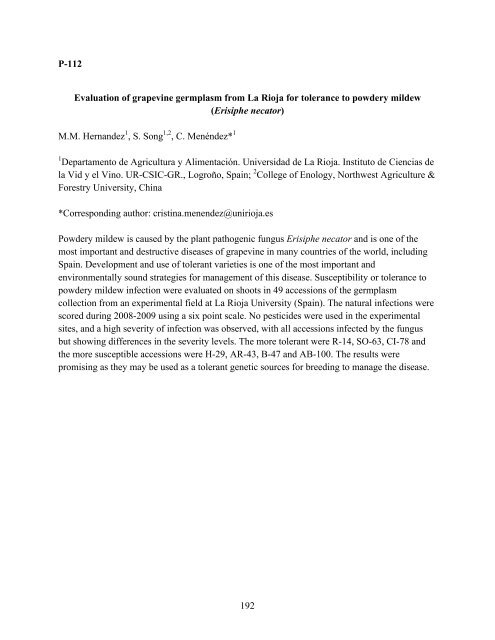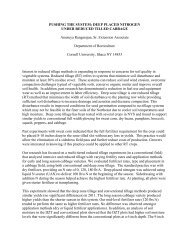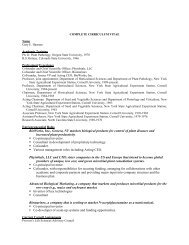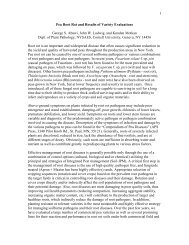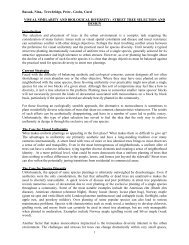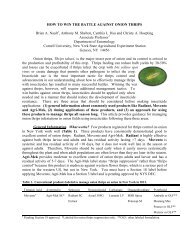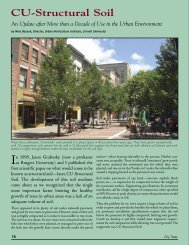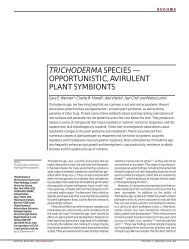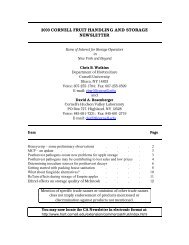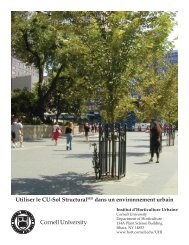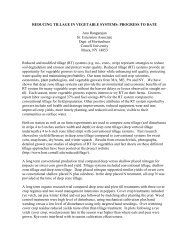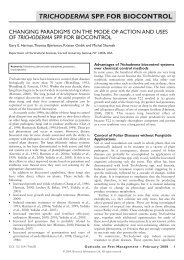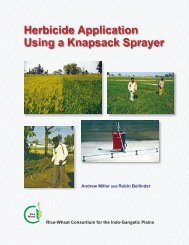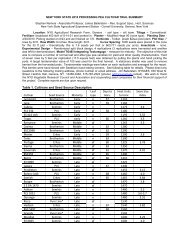- Page 1 and 2:
Date Time Session Topic Sunday Augu
- Page 3 and 4:
Monday August 2, 2010 Opening Plena
- Page 5 and 6:
Topic: Adaptation to soils and clim
- Page 7 and 8:
Tuesday August 3, 2010 Oral Session
- Page 9 and 10:
Poster Session 2 1:30 PM-3:00 PM Po
- Page 11 and 12:
P-105 Pathogen responsiveness and v
- Page 13 and 14:
Table of Contents Keynote Presentat
- Page 15 and 16:
K-2 Progress in grapevine breeding
- Page 17 and 18:
K-4 Genetics and Genomics of Grapev
- Page 19 and 20:
O-2 Additional homologs of the Ren1
- Page 21 and 22:
O-4 Y. Xu and Y.Wang* Introduction
- Page 23 and 24:
O-5 Identification of an R2R3 MYB t
- Page 25 and 26:
O-7 Sequencing of the phylloxera re
- Page 27 and 28:
O-9 Dissection of defense pathways
- Page 29 and 30:
O-11 Recent trends and technologies
- Page 31 and 32:
O-13 Brazilian Grape Breeding Progr
- Page 33 and 34:
O-15 Development of rootstocks for
- Page 35 and 36:
O-17 L. Wang* 1 , S. Li 1, 2 , P. F
- Page 37 and 38:
O-19 Integrated analysis of transcr
- Page 39 and 40:
O-20 Deciphering the chromosome str
- Page 41 and 42:
O-22 Identification of table grapes
- Page 43 and 44:
O-24 Metagenomic sequencing as a to
- Page 45 and 46:
O-26 Regulation of bud fruitfulness
- Page 47 and 48:
O-28 Haplotype structure and cluste
- Page 49 and 50:
O-30 Annette Nassuth Function of Vi
- Page 51 and 52:
10 to 25% of the chlorotic symptoms
- Page 53 and 54:
O-34 Cloning and characterization o
- Page 55 and 56:
O-36 New insight into the genetics
- Page 57 and 58:
O-38 Co-Localization of QTLs for Se
- Page 59 and 60:
O-40 Quantitative analysis of textu
- Page 61 and 62:
O-42 Transcriptional changes in res
- Page 63 and 64:
O-44 The Turkish grape (Vitis vinif
- Page 65 and 66:
Association genetics in relation wi
- Page 67 and 68:
O-47 Intravarietal variability of C
- Page 69 and 70:
O-49 Molecular survey of Georgian t
- Page 71 and 72:
O-51 Marker-assisted breeding: Iden
- Page 73 and 74:
O-53 An Integrated approach to stud
- Page 75 and 76:
O-55 Characteristics of promising m
- Page 77 and 78:
P-2 PMEI and SPY: Two genes with po
- Page 79 and 80:
P-4 Gene-assisted selection for tab
- Page 81 and 82:
P-6 Polyphenolic potential of the r
- Page 83 and 84:
P-8 Monoterpene levels in different
- Page 85 and 86:
P-10 Usefulness of the SCC8 scar ma
- Page 87 and 88:
P-12 The onset of berry ripening is
- Page 89 and 90:
P-14 Morphological characteristics
- Page 91 and 92:
P-16 A genetic analysis of berry qu
- Page 93 and 94:
P-18 Use of molecular markers for s
- Page 95 and 96:
P-20 Characterization of key compon
- Page 97 and 98:
P-22 Expression of early light-indu
- Page 99 and 100:
P-24 The development of molecular m
- Page 101 and 102:
P-26 Identification of ABA inducibl
- Page 103 and 104:
P-28 In vitro selection of HYP tole
- Page 105 and 106:
P-30 In silico SNP detection for ge
- Page 107 and 108:
P-32 Vitis vinifera genome annotati
- Page 109 and 110:
P-34 Genome-wide identification of
- Page 111 and 112:
P-36 Looking for genetic polymorphi
- Page 113 and 114:
P-38 Characterization of a new horm
- Page 115 and 116:
P-40 Towards a characterization of
- Page 117 and 118:
the overall identified polymorphism
- Page 119 and 120:
P-43 Proteomic characterization of
- Page 121 and 122:
P-45 Preliminary observations on th
- Page 123 and 124:
grapevine which will eventually be
- Page 125 and 126:
P-48 ‘Cioutat’: a somatic varia
- Page 127 and 128:
P-50 Estimation of protein spot var
- Page 129 and 130:
glucosyltransferase, anthocyanidin
- Page 131 and 132:
P-53 Marker-free transgenic grapevi
- Page 133 and 134:
P-55 Agrobacterium rhizogenes-media
- Page 135 and 136:
P-57 Phenotypic evaluation of ‘Th
- Page 137 and 138:
P-59 Phenotypic divergence among gr
- Page 139 and 140: P-61 Grepevine variety determinatio
- Page 141 and 142: agricultural context. This network
- Page 143 and 144: P-64 Genetic structure in a large r
- Page 145 and 146: P-66 Analysis of grape rootstocks b
- Page 147 and 148: P-68 Italian wild grapevine: a stat
- Page 149 and 150: Rebula-Robola group were genotyped
- Page 151 and 152: P-71 Viticultural performance of so
- Page 153 and 154: P-73
Molecular characterizat
- Page 155 and 156: P-75 Variation of berry polyphenoli
- Page 157 and 158: P-77 Morphological and molecular id
- Page 159 and 160: P-79 Studies on an excellent, early
- Page 161 and 162: P-81 Effectiveness of different cul
- Page 163 and 164: P-83 Some early maturing table grap
- Page 165 and 166: P-85 New triploid seedless table gr
- Page 167 and 168: P-87 Grape breeding and viticulture
- Page 169 and 170: P-89 The usefulness of allotetraplo
- Page 171 and 172: P-91 Drying rate of fresh berries f
- Page 173 and 174: P-93 Development of table and raisi
- Page 175 and 176: P-95 Reaction of grape rootstocks t
- Page 177 and 178: P-97 Genetic analysis of the resist
- Page 179 and 180: P-99 Berry cracking caused powdery
- Page 181 and 182: P-101 Elicitation of grapevine defe
- Page 183 and 184: P-103 The biological characteristic
- Page 185 and 186: P-105 Pathogen responsiveness and v
- Page 187 and 188: P-107 Screening grape hybrid famili
- Page 189: P-109 Characterization of an ankyri
- Page 193 and 194: P-114 Evaluation of four new rootst


